Welcome to the Amira-Avizo Software Use Case Gallery
Below you will find a collection of use cases of our 3D data visualization and analysis software. These use cases include scientific publications, articles, papers, posters, presentations or even videos that show how Amira-Avizo Software is used to address various scientific and industrial research topics.
Use the Domain selector to filter by main application area, and use the Search box to enter keywords related to specific topics you are interested in.
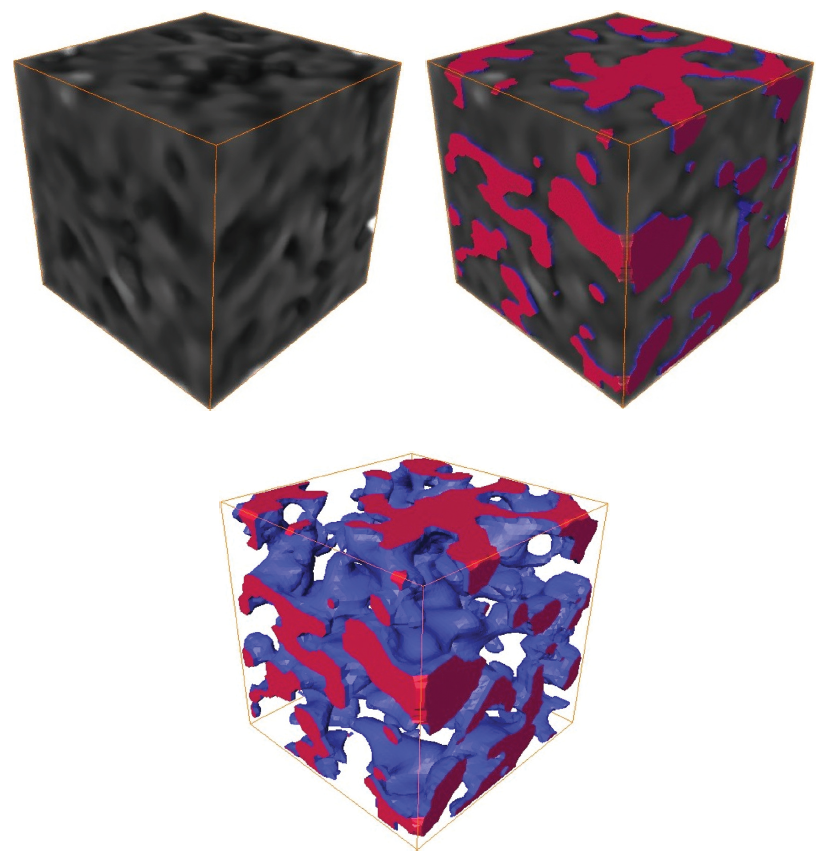
The aim of this paper was to develop a model that can characterize the actual micropore structures in coal and gain an in-depth insight into water’s seepage rules in coal pores under different pressure gradients from a microscopic perspective. To achieve this goal, long-flame coals were first scanned by an X-ray 3D microscope; then, through a representative elementary volume (REV) analysis, the optimal side length was determined to be 60 μm; subsequently, by using Avizo software, the coal ... Read more
Gang Zhou, Lei Qiu, Wenzheng Zhang, and Jiao Xue
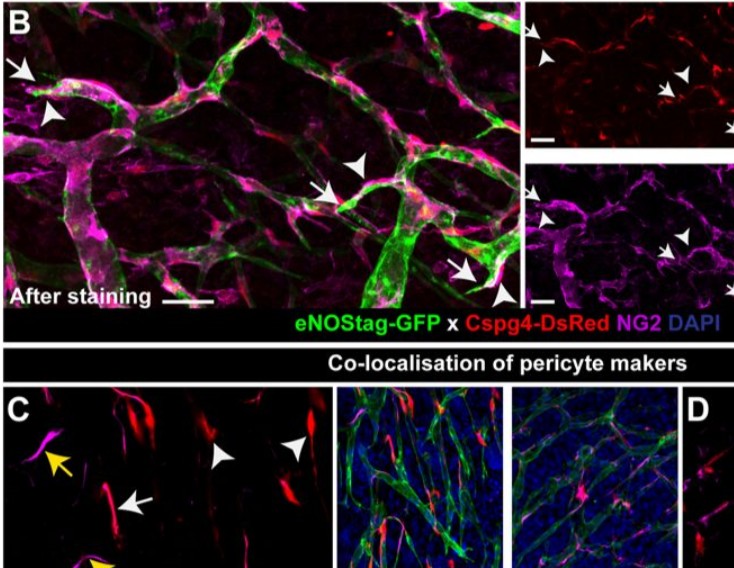
Endothelial cells and pericytes are integral cellular components of the vasculature with distinct interactive functionalities. To study dynamic interactions between these two cells we created two transgenic animal lines. A truncated eNOS (endothelial nitric oxide synthase) construct was used as a GFP tag for endothelial cell evaluation and an inducible Cre-lox recombination, under control of the Pdgfrb (platelet derived growth factor receptor beta) promoter, was created for pericyte assessmen... Read more
Ann L. B. Seynhaeve, Douwe Oostinga, Rien van Haperen, Hanna M. Eilken, Susanne Adams, Ralf H. Adams & Timo L. M. ten Hagen
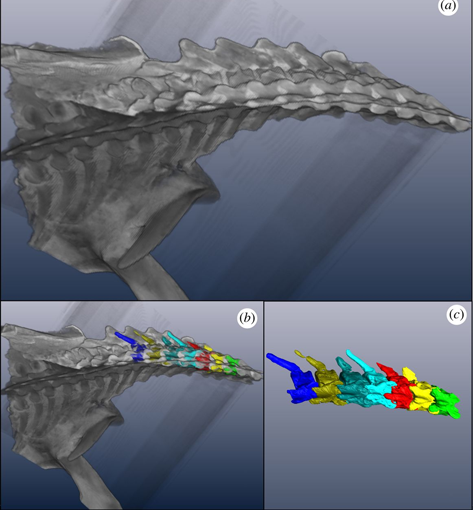
The elongate-necked aquatic plesiosaurs existed for 135 Myr during the Mesozoic. The function of this elongate neck is a point of debate. Using computed tomography and three-dimensional (3D) modelling, the range of motion (ROM) of the plesiosaur Nichollssaura borealis neck was assessed. To quantify the ROM, the intervertebral mobility was measured along the cervical vertebral column. This was done by manipulating the 3D models in the lateral and dorsoventral directions during two tri... Read more
Ramon S. Nagesan, Donald M. Henderson, Jason S. Anderson
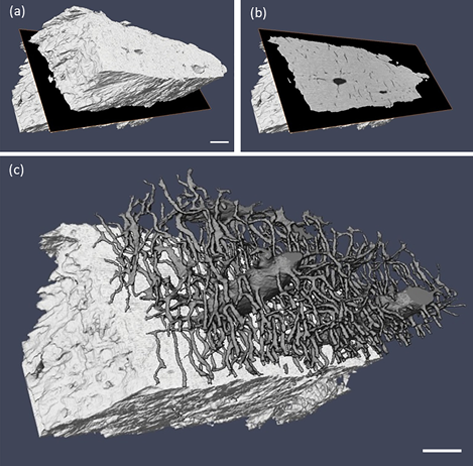
Ptychographic X-ray computed tomography (PXCT) is a quantitative imaging modality that non-destructively maps the 3D electron density inside an object with tens of nanometers spatial resolution. This method provides unique access to the morphology and structure of the osteocyte lacuno-canalicular network (LCN) and nanoscale density of the tissue in the vicinity of an osteocyte lacuna. Our findings indicate that PXCT can non-destructively provide detailed, nanoscale information on the 3D org... Read more
Antonia Ciani, Hechmi Toumi, Stéphane Pallu, Esther H.R.Tsai, Ana Diaz, Manuel Guizar-Sicairos, Mirko Holler, Eric Lespessailles, Cameron M.Kewish | Synchrotron Soleil, France
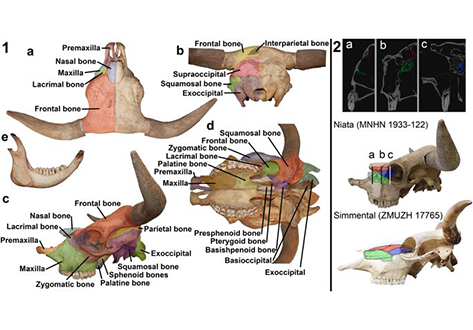
The Niata was a cattle variety from South America that figured prominently in writings on evolution by Charles Darwin. Its shortened head and other aspects of its unusual morphology have been subject of unsettled discussions since Darwin’s time. Here, we examine the anatomy, cranial shape, skull biomechanics, and population genetics of the Niata. Our results show that the Niata was a viable variety of cattle and exhibited anatomical differences to known chondrodysplastic forms. In cranial s... Read more
Kristof Veitschegger, Laura A. B. Wilson, Beatrice Nussberger, Glauco Camenisch, Lukas F. Keller, Stephen Wroe, Marcelo R. Sánchez-Villagra
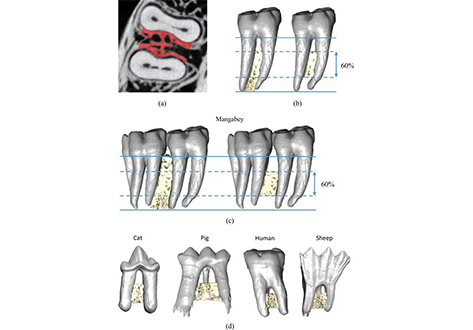
Mechanical adaptation of trabecular bone morphology in the mammalian mandible
Alveolar bone, together with the underlying trabecular bone, fulfils an important role in providing structural support against masticatory forces. Diseases such as osteoporosis or periodontitis cause alveolar bone resorption which weakens this structural support and is a major cause of tooth loss. However, the functional relationship between alveolar bone remodelling within the molar region and masticatory forces is not well understood. This study investigated this relationship by comparing m... Read more
Peter J. Watson, Laura C. Fitton, Carlo Meloro, Michael J. Fagan, Flora Gröning
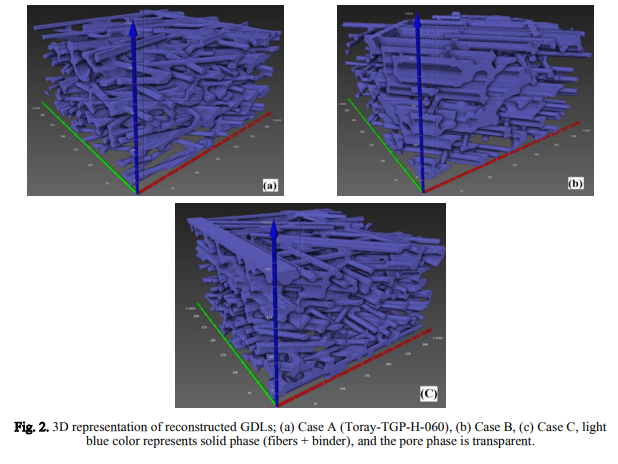
Stochastic reconstruction of carbon fiber paper gas diffusion layers of PEFCs: A comparative study
Fuel cells are electrochemical devices that convert the chemical energy of fuels into electrical energy. An ideal option for a wide variety of portable, stationary, and automotive applications is using the polymer electrolyte
fuel cells due to their modular design, high efficiency, and environmental benefits.
A 3D microstructure of the non-woven gas diffusion layers (GDLs) of polymer electrolyte fuel cells (PEFCs) is reconstructed using a stochastic method. For a commercial GDL, ... Read more
Sepehr Sima Afrookhteh, Jalil Jamali, Mohsen Shakeric, Majid Baniassadi
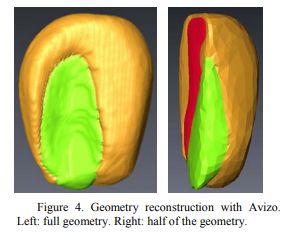
Drying of Corn Kernels: From Experimental Images to Multiscale Multiphysics Modeling
This work demonstrated the importance and feasibility of experimental image
to simulation workflow. The workflow is successfully applied to a food processing study, where multiphysics and multiscale modeling
based on 3D experimental image reconstruction contributes to the preservation of corn, one of the major food sources for the world population.
Corn kernels have a complex structure as they are composed of a pericarp layer outside and contain hard and soft endosperm and ... Read more
Pawan S. Takhar, and Shuang Zhang
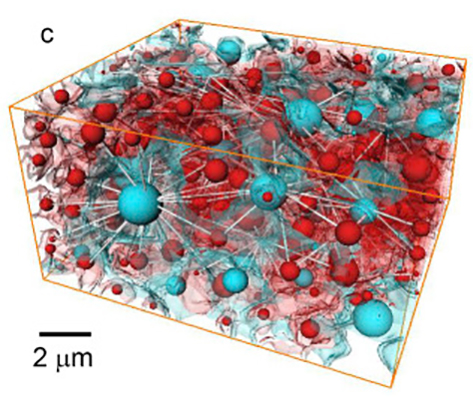
Correlation between triple phase boundary and the microstructure of Solid Oxide Fuel Cell anodes
This study aims to correlate the active triple phase boundaries (TPBs) to the variation of as-prepared anode microstructures and Ni densifications based on the reconstructed 3D volume of an SOFC anode, providing a point of comparison with theoretical studies that reveal the relationship of TPBs and the material microstructure using randomly packed spheres models.
Read more
Xuekun Lu, Thomas M.M. Heenan, Josh J. Bailey, Tao Li, Kang Li, Daniel J.L. Brett, Paul R. Shearing, Electrochemical Innovation Lab, Department of Chemical Engineering, University College London, London
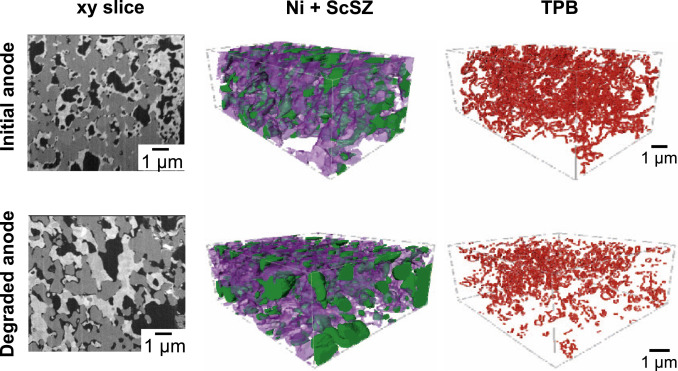
Nickel/zirconia-based nanostructured electrodes for solid oxide fuel cells suffer from poor stability even at intermediate temperature.
This study quantifies the electrochemical and microstructural degradation of nanostructured electrodes by combining 3D tomography, electrochemical impedance spectroscopy (EIS) and mechanistic modeling. For the first time, the electrochemical degradation of nanostructured electrodes is quantified according to the fractal nature of the three-phase bounda... Read more
A. Bertei, E. Ruiz-Trejo, K. Kareh, V. Yufit, X. Wang, F. Tariq, N.P. Brandon,
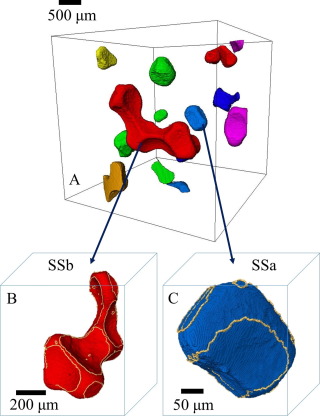
Multiphase flow in porous media is strongly influenced by the wettability of the system, which affects the arrangement of the interfaces of different phases residing in the pores.
We present a method for estimating the effective contact angle, which quantifies the wettability and controls the local capillary pressure within the complex pore space of natural rock samples, based on the physical constraint of constant curvature of the interface between two fluids. This algorithm is ... Read more
Alessio Scanziani, Kamaljit Singh, Martin J. Blunt, Alberto Guadagnini
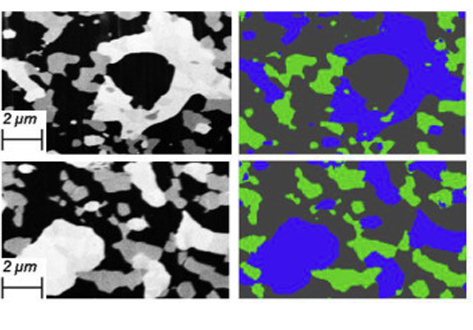
Quantification of the degradation of Ni-YSZ anodes upon redox cycling
Ni-YSZ anodes for Solid Oxide Fuel Cells are vulnerable to microstructural damage during redox cycling leading to a decrease in the electrochemical performance.
- Quantification of redox damage by coupling 3D tomography, EIS and nanoindentation.
- YSZ fracture, Ni detachment and agglomeration led to irreversible mechanical damage.
- Ni nanoparticles obtained upon redox cycling improve electrochemical performance.
- Loss in TPB densi... Read more
Bowen Song, Enrique Ruiz-Trejo, Antonio Bertei, Nigel P.Brandon
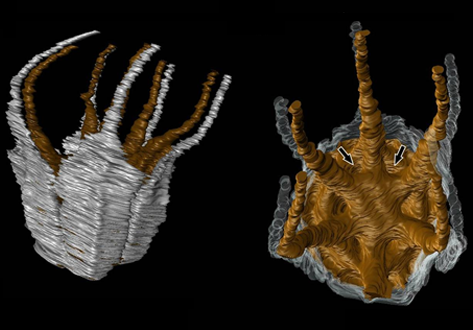
Angiosperm-dominated floras of the Late Cretaceous are essential for understanding the evolutionary, ecological, and geographic radiation of flowering plants.
The Late Cretaceous–early Paleogene Deccan Intertrappean Beds of India contain angiosperm-dominated plant fossil assemblages known from multiple localities in central India. Numerous monocots have been documented from these assemblages, providing a window into an important but poorly understood time in their diversification. On... Read more
Kelly K.S. Matsunaga, Selena Y. Smith, Steven R. Manchester, Dashrath Kapgate, Deepak Ramteke, Amin Garbout, and Herminso Villarraga-Gómez
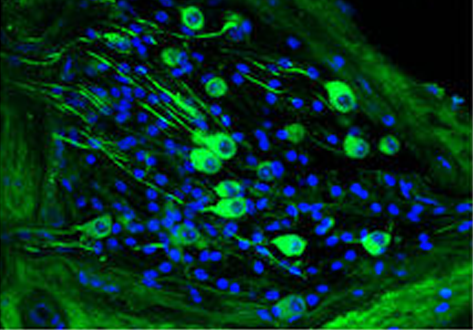
Chronic cigarette smoke exposure drives spiral ganglion neuron loss in mice
Tobacco use is associated with an increased risk of hearing loss in older individuals, suggesting cigarette smoke (CS) exposure may target the peripheral auditory organs. However, the effects of CS exposure on general cochlear anatomy have not previously been explored.
Here we compare control and chronic CS exposed cochleae from adult mice to assess changes in structure and cell survival. Two-photon imaging techniques, including the imaging of second harmonic generation (SHG) and two-p... Read more
Stephen T. Paquette, Ryan P. Dawes, Isaac K. Sundar, Irfan Rahman, Edward B. Brown & Patricia M. White
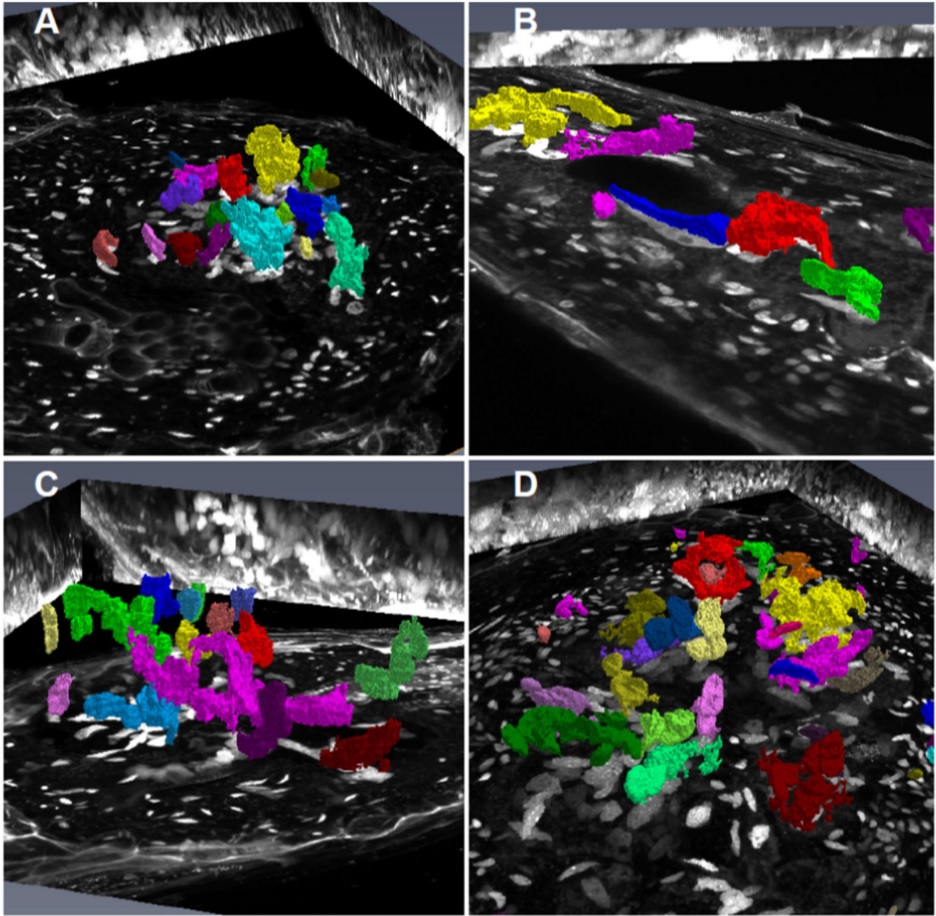
Root-knot nematodes induce galls that contain giant-feeding cells harboring multiple enlarged nuclei within the roots of host plants. It is recognized that the cell cycle plays an essential role in the set-up of a peculiar nuclear organization that seemingly steers nematode feeding site induction and development. Functional studies of a large set of cell cycle genes in transgenic lines of the model host Arabidopsis thaliana have contributed to better understand the role of the cell cycle comp... Read more
Antonino de Souza Junior José Dijair, Pierre Olivier, Coelho Roberta R., Grossi-de-Sa Maria F., Engler Gilbert, de Almeida Engler Janice / Institut National de la Recherche Agronomique, Université Côte d’Azur, Centre National de la Recherche Scientifique, Institut Sophia Agrobiotech, Sophia-Antipolis, France
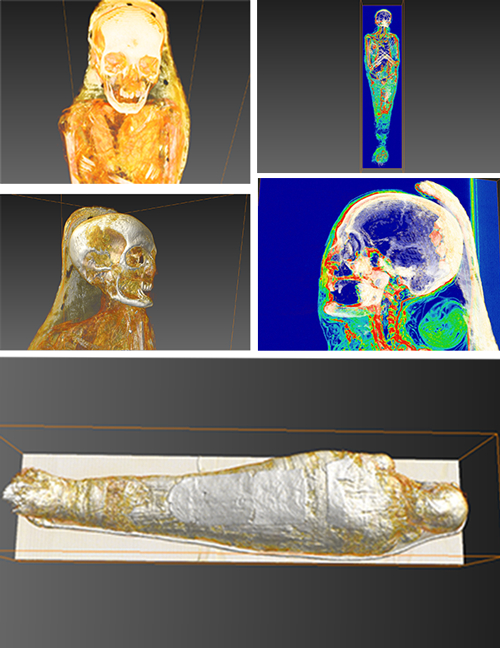
AMSC Research, LLC uses Amira software to understand processes and rituals of Egyptian mummification
“Scanning is important, but it is really just the first step in an immersive exploration of artifacts” says Elias. Raw data from scans taken of mummies (or other archaeological subject matter) is delivered to AMSC Research as files in a language known as DICOM. Next, these are converted into a visually readable form for analytical purposes and to launch the creative modeling process.
Elias uses Amira software to analyze scan data. Mummies are biological entities, so apart f... Read more
Dr. Jonathan Elias, AMSC Research, LLC
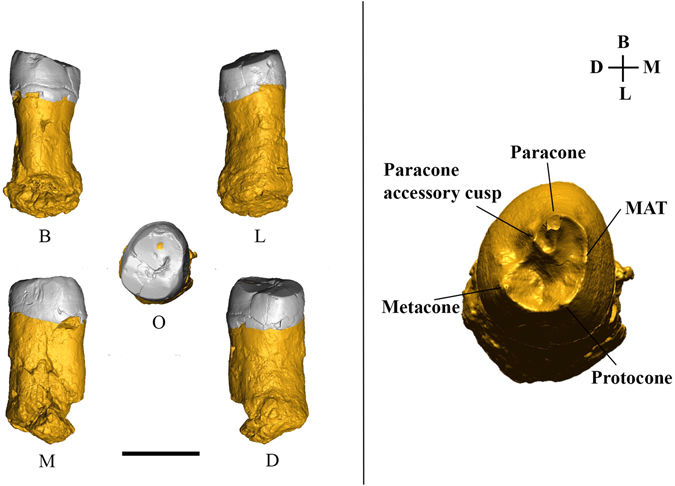
The first Neanderthal remains from an open-air Middle Palaeolithic site in the Levant
The late Middle Palaeolithic (MP) settlement patterns in the Levant included the repeated use of caves and open landscape sites. The fossil record shows that two types of hominins occupied the region during this period—Neandertals and Homo sapiens. Until recently, diagnostic fossil remains were found only at cave sites. Because the two populations in this region left similar material cultural remains, it was impossible to attribute any open-air site to either species. In this study... Read more
Ella Been, Erella Hovers, Ravid Ekshtain, Ariel Malinski-Buller, Nuha Agha, Alon Barash, Daniella E. Bar-Yosef Mayer, Stefano Benazzi, Jean-Jacques Hublin, Lihi Levin, Noam Greenbaum, Netta Mitki, Gregorio Oxilia, Naomi Porat, Joel Roskin, Michalle Soudack, Reuven Yeshurun, Ruth Shahack-Gross, Nadav Nir, Mareike C. Stahlschmidt, Yoel Rak & Omry Barzilai
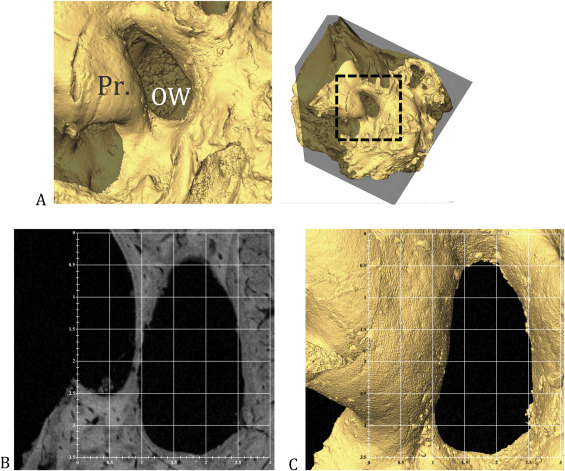
Echoes from the past: New insights into the early hominin cochlea from a phylo-morphometric approach
Investigation on cochlear variation, an indirect evidence of auditory capacities among early hominins and extant catarrhine species, in order to assess (i) the phylogenetic signal of relative external cochlear length (RECL) and oval window area (OWA), the evolutionary model with the highest probability of explaining our observed data, some hominin ancestral nodes for RECL and OWA. RECL has a high phylogenetic signal under a Brownian motion model, and is closely correlated with body mass. Our... Read more
José Braga, Priscille Bouvier, Jordan Romeyer Dherbey, Patricia Balaresque, Laurent Risser , Jean-Michel Loubes , Jean Dumoncel , Benjamin Duployer , Christophe Tenailleau
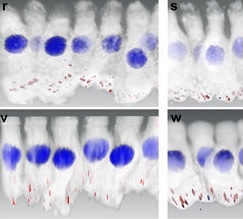
Noise induced hearing loss (NIHL) is a disease that affects millions of Americans. Identifying genetic pathways that influence recovery from noise exposure is an important step forward in understanding NIHL. The transcription factor Foxo3 integrates the cellular response to oxidative stress and plays a role in extending lifespan in many organisms, including humans. Here we show that Foxo3 is required for auditory function after noise exposure in a mouse model system, measured by ABR…Read more
Felicia Gilels, Stephen T. Paquette, Holly J. Beaulac, Anwen Bullen & Patricia M. White
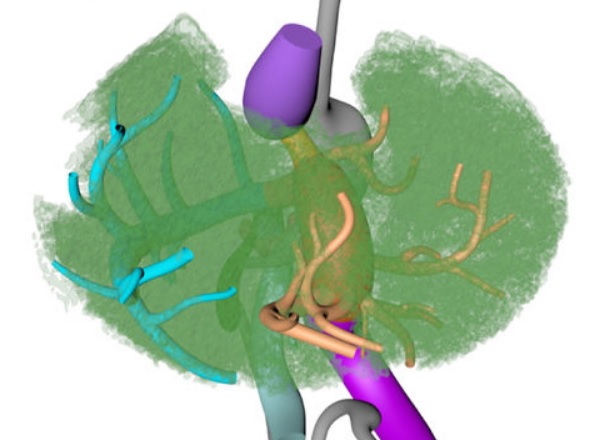
Couinaud based his well-known subdivision of the liver into (surgical) segments on the branching order of portal veins and the location of hepatic veins. However, both segment boundaries and number remain controversial due to an incomplete understanding of the role of liver lobes and vascular physiology on hepatic venous development. Human embryonic livers (5–10 weeks of development) were visualized with Amira 3D-reconstruction and Cinema 4D-remodeling software.
Read more
Jill P. J. M. Hikspoors, Mathijs M. J. P. Peeters, Nutmethee Kruepunga, Hayelom K. Mekonen, Greet M. C. Mommen, S. Eleonore Köhler & Wouter H. Lamers
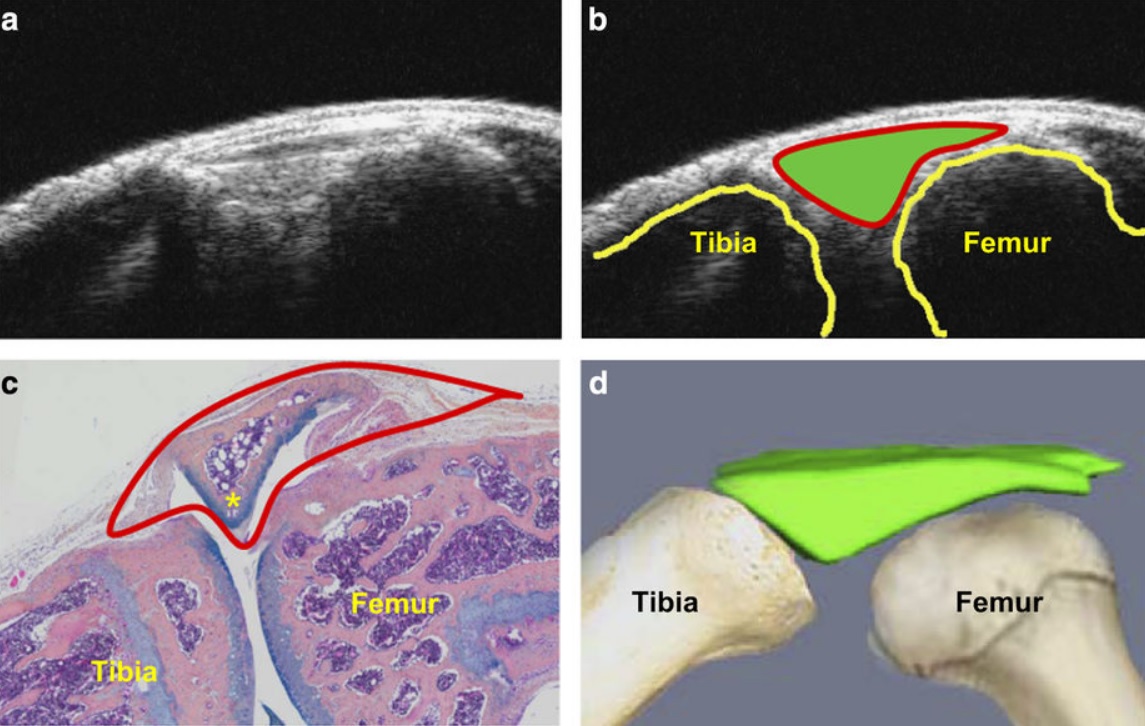
Ultrasound could be a fast and cost-effective means of assessing joint changes in mouse models of posttraumatic osteoarthritis (PTOA). Such models are essential for understanding the biology of this degenerative joint disease and developing new treatments, but noninvasive methods of evaluating disease activity are lacking. Because ultrasound can visualize both joint space volumes and blood flow in the joints, it could provide an alternative to microscopic examination of tissue, assuming it ac... Read more
Hao Xu, Echoe M Bouta, Ronald W Wood, Edward M Schwarz, Yongjun Wang & Lianping Xing